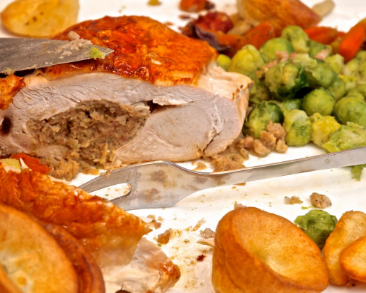130 million Brussels sprouts, 77 million pigs in blankets, 90 million slices of turkey and enough gravy to fill an Olympic swimming pool! These are just some of the most wasted food items in the UK over the Christmas period. Food waste is a big contributor to climate change, so we are keen to help reduce it at a supply chain level as well as in people’s homes. So, we’ve put together some tips, tricks and recipes to help you make the most of your festive groceries this year.
How to Avoid Food Waste At Christmas
We’ve split up our tips into three different categories; things you can do before Christmas to reduce food waste. How you can keep on top of it on Christmas day, or other days where you are preparing a big meal. Plus, what to do if you have leftovers of dishes and ingredients.
Preparation
Preparation is key when it comes to a stress-free holiday period and ensuring waste is reduced.
- In the run-up to Christmas, things can get really busy for many of us. Create weeknight meals ahead of time to give you some breathing space and ensure food isn’t wasted in the week before. If you are struggling to find the time to shop or cook, you can try ready meals. While they usually have more packaging than doing it yourself, a set portion will avoid wastage. If you are lucky enough to live in Sheffield, one of our partners, Food Works Sheffield, offers their Just Meals service. Delicious ready meals created from food waste.
- If you are the head chef, plan your Christmas meals out ahead of time. This will allow you to buy the right amount of ingredients for the people you are serving. Only plan to serve food that you are confident will get eaten. Our friends at Can Do South Yorkshire have put together an amazing list of tips on How to reduce the climate impact of Christmas Dinner here. You can also use a portion planner to help you decide what to buy.

On The Day
Christmas Day, Boxing Day and New Year can be full of fun but they can also be stressful when you’re juggling the cooking. Here are some tips to get prepped for any day where you are cooking a big meal. Preparation is key once more and you can start the evening before.
- If you’ve already planned your meal, you should have all the ingredients ready to go. But you can also write down the timing and prep needed to make sure everything runs smoothly.
- Ensure you have containers for leftovers and ingredients clean and ready to be used. It’s less tempting to put items straight in the bin if they already have a home waiting for them. Here are some things you can do to keep ingredients in tip-top condition.
- Citrus fruits for drinks, dressings and desserts can be stored in water to keep them juicy. You can also do this with sliced citrus fruit.
- Storing veg in water in the fridge will keep them crisp for longer, the same for herbs for sauces and cocktails.
- For any meat or fish, ensure your containers have a sealable lid and you use separate boards and dishes to avoid cross-contamination.
- Consider what you’ll do with food scraps and trimmings. While not everyone has access to this, composting your veg trimmings is a great way to reduce wastage. If you can’t compost at home or with your council, consider saving peelings and cuttings to make veg stock. You can freeze veggie scraps until you have enough to make stock.
Leftovers
Leftovers are where a lot of food waste comes from. While planning ahead can reduce leftovers, sometimes you’ll end up with an excess of a dish or ingredients. Here’s what to do when that happens.
- Whether it’s veg, meat or the pigs in blankets, there are countless ways to use up leftovers. BBC Goodfood has a huge collection of Christmas leftover recipes to give you some ideas.
- For leftover ingredients, check out Love Food Hate Waste’s guide on food storage. Finding out the best method will ensure your fresh ingredients last longer.
- Utilise your freezer. When in doubt and running out of time, freezing leftovers is always great if you have the option. Ensure items are well wrapped to avoid freezer burn and label containers with the date it was frozen.
- Dried and long shelf life goods can be stored in cupboards or pantries for use in the new year. But, if you find yourself with one too many items, why not consider donating to your local food bank. Donations are frequently up in December but can go down in January, even though community members still need assistance. Donating non-perishables is one way to avoid food waste and help your neighbours. If you live in Sheffield, here is a list of food banks in the city.
